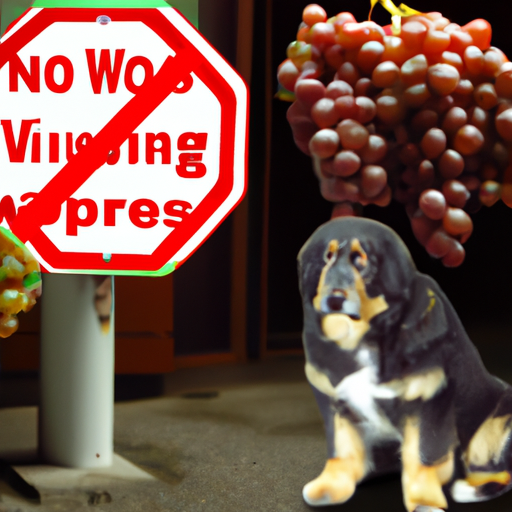As a devoted caregiver to your furry friend, it’s only natural to want to share your snacks and treats with them. However, certain foods that are perfectly safe and healthy for humans can be dangerous, and even deadly, for dogs. One such food is the seemingly harmless grape.
Table of Contents
- The Dangers of Grapes to Dogs
- The Science Behind Grape Toxicity
- Symptoms of Grape Poisoning
- What to Do If Your Dog Eats Grapes
- Frequently Asked Questions
The Dangers of Grapes to Dogs
Grapes, along with their dried counterparts, raisins, are known to be highly toxic to dogs. This toxicity can lead to acute kidney failure, a serious condition that requires immediate veterinary attention. According to the ASPCA, even small amounts of grapes or raisins can cause severe health problems for your pet.
Key Takeaways:
- Grapes and raisins are highly toxic to dogs
- Even small amounts can cause severe health problems
- The toxicity can lead to acute kidney failure
It’s important to keep in mind that the toxicity level can vary from dog to dog. Some dogs might ingest grapes or raisins and show no signs of distress or illness. However, for others, just a small amount can lead to serious health problems. Don’t play Russian roulette with your dog’s health; it’s simply not worth the risk.
The Science Behind Grape Toxicity
The exact reason why grapes are toxic to dogs is still unknown. Researchers have yet to identify the specific toxin that causes the adverse reactions in dogs. There is no known safe quantity of grapes for dogs, so it’s best to avoid giving them any amount.
One theory suggests that it could be the pesticides, fungicides, or other chemicals used in grape production that cause the toxicity. However, this theory doesn’t explain why all dogs aren’t affected or why dogs can consume other fruits and vegetables that have been treated with similar substances without any adverse effects.
Another suggestion from PetMD is that a mycotoxin (a toxin produced by fungus or mold) might be the culprit. However, no definitive evidence has proven this theory either.
Symptoms of Grape Poisoning
Dog owners need to be aware of the signs and symptoms of grape toxicity. These may include:
- Vomiting or diarrhea – often within a few hours of ingestion.
- Loss of appetite
- Lethargy, weakness, or unusual stillness
- Dehydration
- Abdominal pain
- Oliguria (passing only a small amount of urine) or anuria (failure of the kidneys to produce urine)
If your dog exhibits any of these symptoms after eating grapes or raisins, it’s crucial to seek veterinary attention immediately.
What to Do If Your Dog Eats Grapes
If you suspect that your dog has ingested grapes or raisins, the first thing to do is contact your vet or a pet poison control center immediately. Do not attempt to induce vomiting unless instructed to do so by a professional.
Your vet may recommend a specific course of action based on your dog’s overall health, size, and the amount of grapes or raisins they consumed. This could include inducing vomiting, administering activated charcoal (which can help prevent the toxins from being absorbed), or providing IV fluids and supportive care to help protect the kidneys.
Check out this article on One Top Dog for more information on how to care for a sick dog.
Frequently Asked Questions
1. Can dogs eat grapes?
No, dogs cannot eat grapes. They are highly toxic to dogs and can lead to acute kidney failure.
2. What should I do if my dog eats a grape?
If your dog eats a grape, contact your vet or a pet poison control center immediately.
3. Are all types of grapes toxic to dogs?
Yes, all types of grapes (red, green, seedless, etc.) are toxic to dogs.
4. Can a small amount of grape or raisin be safe for dogs?
No, there is no known safe quantity of grapes for dogs. Even a small amount can be dangerous.
5. Are other fruits and vegetables safe for dogs?
Many fruits and vegetables are safe for dogs to eat. However, it’s always best to check with your vet before introducing a new food into your dog’s diet.
Learn more about what fruits and vegetables are safe for dogs here.
In conclusion, while it might be tempting to share your snacks with your beloved pet, it’s crucial to know what foods are safe and which are not. When it comes to grapes and raisins, the message is clear: keep them well out of your dog’s reach.
Find more useful tips on keeping your dog safe and healthy on One Top Dog.



